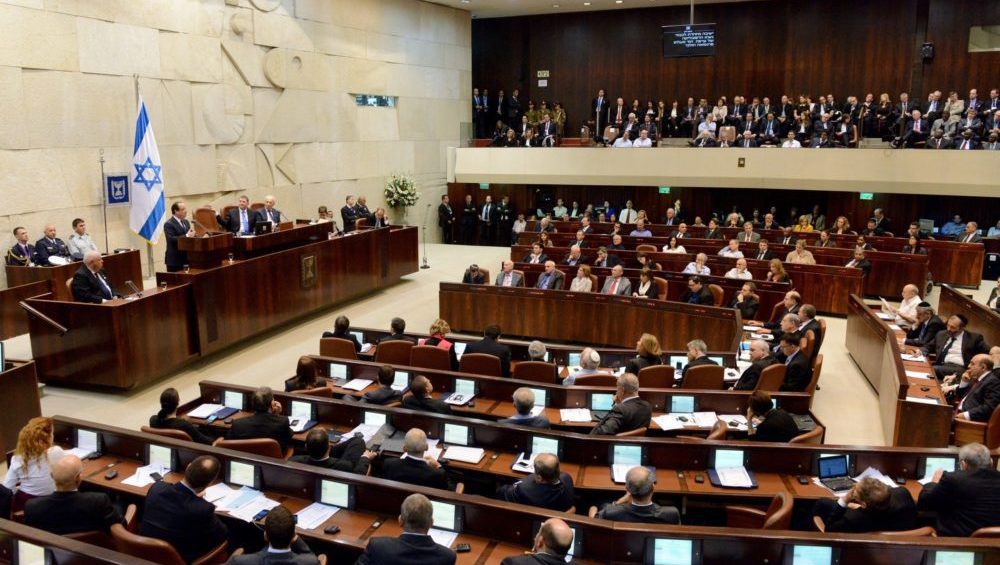Egged on by the Biden administration, Israel’s interim government is on the brink of undermining both the country’s security and its constitution by signing a deal that would give the Iranian puppet-state in Lebanon hundreds of miles of territory in the Mediterranean Sea—and the vast reserves of natural gas underneath.
With the Israeli and Lebanese prime ministers in New York last week, the American-mediated negotiations are reportedly in their final stages. The U.S.’s final proposal is expected by the end of the week, and the recipe for compromise is simple: Israel accepts all Lebanon’s territorial claims and redraws its borders.
Under international law, countries have sovereignty of the seabed extending out from their shores, as well as its undersea resources. Maritime disputes between neighboring countries are common, based on different angles of lines drawn from the coast, and the Israel-Lebanon one goes back at least a decade.
The standard principle in maritime mediation is equitable division somewhere down the middle, as earlier mediation efforts had proposed here. But the deal reportedly being finalized requires Jerusalem to meet Beirut’s claims in full. Under the proposal, Israel would give Lebanon the waters north of what is known as “Line 23,” which is Lebanon’s declared border that it has formally submitted to the United Nations.
Hezbollah, the Iranian proxy that largely controls Lebanon, has ratcheted up pressure for concessions in recent months by threatening to launch missiles at Israel’s pumping facilities, which are supposed to begin operations imminently.
It does not advance U.S. strategic interests to propose a deal that would strengthen Hezbollah, a State Department-designated terror group that was found liable for $110 million in federal court just last week for rocket attacks that injured U.S. citizens. But the stakes are even higher for Israel, whose government is replaying the wishful-thinking diplomacy that has led to its costliest historical blunders.
The deal more closely resembles Israel’s 2005 unilateral withdrawal from the Gaza Strip—which empowered Hamas and failed to bring peace—than the Camp David Accords. Israel would accede entirely to Lebanon’s territorial claims, while not getting a peace treaty, or even formal national recognition in return. Indeed, Beirut does not even acknowledge Israel’s existence. This is not even the failed formula of “land for peace”; it is “territory for temporary quiet.”
Nor is this about territories that came under Israel’s control in 1967. There is no question here of “occupation,” or opposition by the so-called “international community” to Israel’s claimed borders. By agreeing to hand over sovereign Israeli territory, Israeli Prime Minister Yair Lapid would be removing any ceiling on future demands from the Palestinians and others.
Defenders of the agreement posit that granting Lebanon significant natural gas reserves will give the country “something to lose” in the event of a conflict with Israel. Hezbollah would not want to start a conflict that could so severely hurt Lebanon’s economy, the thinking goes. These fantasies ignore that Lebanon’s economy has reached its precarious state in large part due to Hezbollah. And Iran does not mind seeing its regional puppet-states implode, judging by the situation in Iraq, Syria, and Yemen alike.
The notion that the gas fields give Lebanon “something to lose” also depends on the unlikely assumption that Israel would target these fields, operated by a French company, in retaliation for a Hezbollah missile attack on Israeli facilities. In reality, the entire international community—as well as legal and environmental concerns—would restrain Israel.
In the Oslo Accords, Israel brought a bankrupt PLO in from Tunisia and gave it a government so it would have “something to lose.” Instead, the PLO launched terror attacks that killed thousands of Israelis—and Israel today fears dismantling the organization, along with the Palestinian Authority, because it would lead to instability in Judea and Samaria.
According to news reports, American and Lebanese negotiators have been scrambling to reach a deal this month in order to finish before Israel’s November 1 elections, which were triggered by the collapse of the current government. Lapid became caretaker prime minister when Naftali Bennett’s government fell, thus enjoying a formal term of only four months before the elections. Given the long course of dispute, it is more than a coincidence that the deal is being rammed through during Lapid’s fleeting ministry. With elections mere weeks away, Hezbollah attacks on Israel’s new gas facilities would be disastrous for Lapid.
On the Israeli side, accepting the deal would also mean ignoring a variety of constitutional restrictions. The Israeli Supreme Court forbids lame-duck governments from taking major actions, but given its left-wing slant the Court is unlikely to intervene if Lapid completes the gas deal. An Israeli constitutional law requires a full Knesset majority and a national referendum on any surrender of sovereign territory. The government plans to formally conduct neither, because it knows it would lose; indeed, the government will reportedly pass the agreement in secret, and only later reveal its contents to the public.
Thus, Israel will pay for this agreement not just in fossil fuels and territorial integrity, but also in harm to its democracy itself. But the international audiences that clutch their pearls over threats to the rule of law are unlikely to object when such actions are taken in the name of territorial surrender to terrorist demands.
First published in Newsweek, (“Israel Must Reject a Terrible Natural Gas Deal With Hezbollah,” September 29, 2022).




